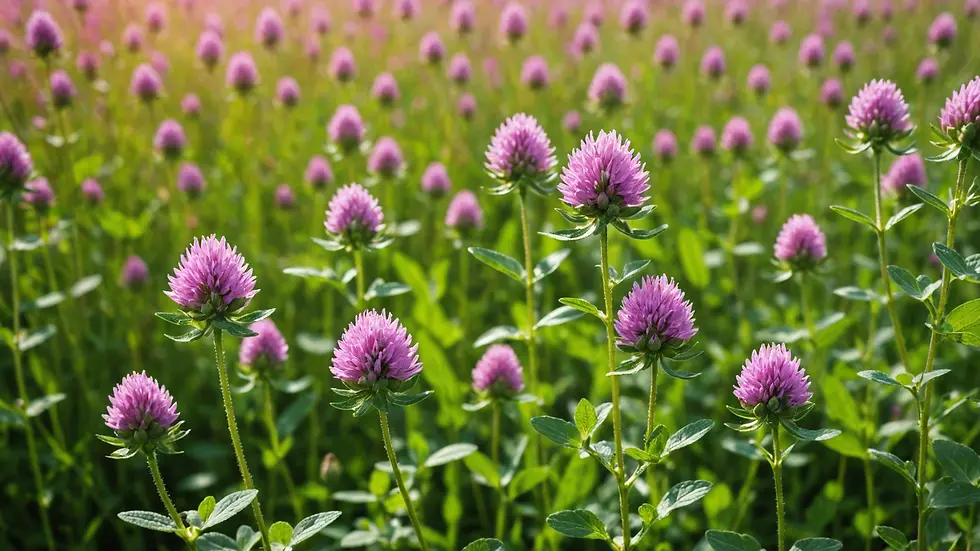Exploring the Top Herbal Remedies for Managing PMS and Menopausal Symptoms
- Tiffany Robinson
- May 14, 2019
- 3 min read
Updated: Jan 6
Navigating the emotional and physical challenges of premenstrual syndrome (PMS) and menopause can be daunting. Many people seek natural remedies to alleviate symptoms such as mood swings, hot flashes, and cramps. Herbs have been used for centuries to support women's health, and understanding which ones may help can provide some relief. This guide presents several herbs known for their potential benefits related to PMS and menopausal symptoms.
Understanding PMS and Menopause
PMS is a collection of physical and emotional symptoms that occur in the lead-up to a menstrual period. Symptoms can range from mild to severe and may include irritability, bloating, fatigue, and headaches.
On the other hand, menopause marks the end of a woman's reproductive years, often accompanied by significant hormonal shifts. Symptoms can include hot flashes, night sweats, mood swings, and sleep disturbances.
Fortunately, various herbs can support hormonal balance and alleviate some of these discomforts.
1. Chaste Tree Berry (Vitex agnus-castus)
Benefits
Chaste tree berry is one of the most well-studied herbs for PMS. It is believed to influence hormones by acting on the pituitary gland, potentially balancing estrogen and progesterone levels.
For many, this balance can help alleviate mood swings, irritability, and breast tenderness associated with PMS. Furthermore, it may also ease menopause symptoms by promoting regular menstrual cycles.

How to Use
Chaste tree is commonly available in the form of capsules, tinctures, and teas. It’s essential to consult a healthcare provider before starting, as individual responses may vary.
2. Black Cohosh (Actaea racemosa)
Benefits
Black cohosh is a well-known herb for managing menopausal symptoms. It is particularly effective against hot flashes and mood swings. Research suggests that it may act on estrogen receptors, providing a natural alternative to hormone therapy for women seeking relief.
Many women find that taking black cohosh improves their quality of life during this transition.

How to Use
Black cohosh is typically consumed in capsule form or as a tincture. As with any supplement, it’s advisable to discuss usage with a qualified healthcare practitioner.
3. Dong Quai (Angelica sinensis)
Benefits
Known as "female ginseng," Dong Quai has been traditionally used in Chinese medicine to balance hormones and promote reproductive health. The herb is thought to improve blood flow and relieve symptoms associated with both PMS and menopause.
Some studies suggest Dong Quai can alleviate symptoms like cramps and may even enhance mood by supporting hormonal balance.
How to Use
Dong Quai is available in capsules, powders, and teas. Users should be cautious, especially if taking anticoagulant medications, and do consult a healthcare professional.
4. Red Clover (Trifolium pratense)
Benefits
Red clover is rich in isoflavones, plant compounds that mimic estrogen in the body. This makes it particularly beneficial for women experiencing menopausal symptoms. It has been noted for reducing hot flashes, night sweats, and improving overall mood and well-being.
This herb is also thought to support cardiovascular health, making it advantageous as women age.

How to Use
Red clover can be taken in supplement form or enjoyed as a tea. As with all herbal remedies, individual reactions may differ, so consulting with a healthcare provider is crucial.
5. Evening Primrose Oil (Oenothera biennis)
Benefits
Evening primrose oil is known for its high gamma-linolenic acid (GLA) content, an omega-6 fatty acid that has anti-inflammatory properties. Many find it beneficial for reducing breast tenderness and irritability associated with PMS.
Furthermore, it’s been studied for its potential to alleviate hot flashes during menopause, making it a versatile remedy.
How to Use
Evening primrose oil is typically available in softgel capsules and can be taken daily. It’s important to follow the recommended dosage and discuss use with a healthcare provider, especially if taking other medications.
Conclusion
Managing PMS and menopausal symptoms can be challenging, but incorporating certain herbal remedies can provide relief and support hormonal balance. Herbs like chaste tree berry, black cohosh, Dong Quai, red clover, and evening primrose oil each offer unique benefits that may help ease various symptoms.
As always, consult with a healthcare professional before starting any new herbal regimen to ensure safety and proper dosage. Given the diversity of natural remedies available, finding the right combination may empower many women to provide more ease during these transitional phases in their lives.
Exploring these herbal options can lead to a more comfortable and balanced experience, supporting overall well-being during PMS and menopause. Whether opting for tea, capsules, or tinctures, natural remedies can be a vital part of one's health strategy.


Comentarios